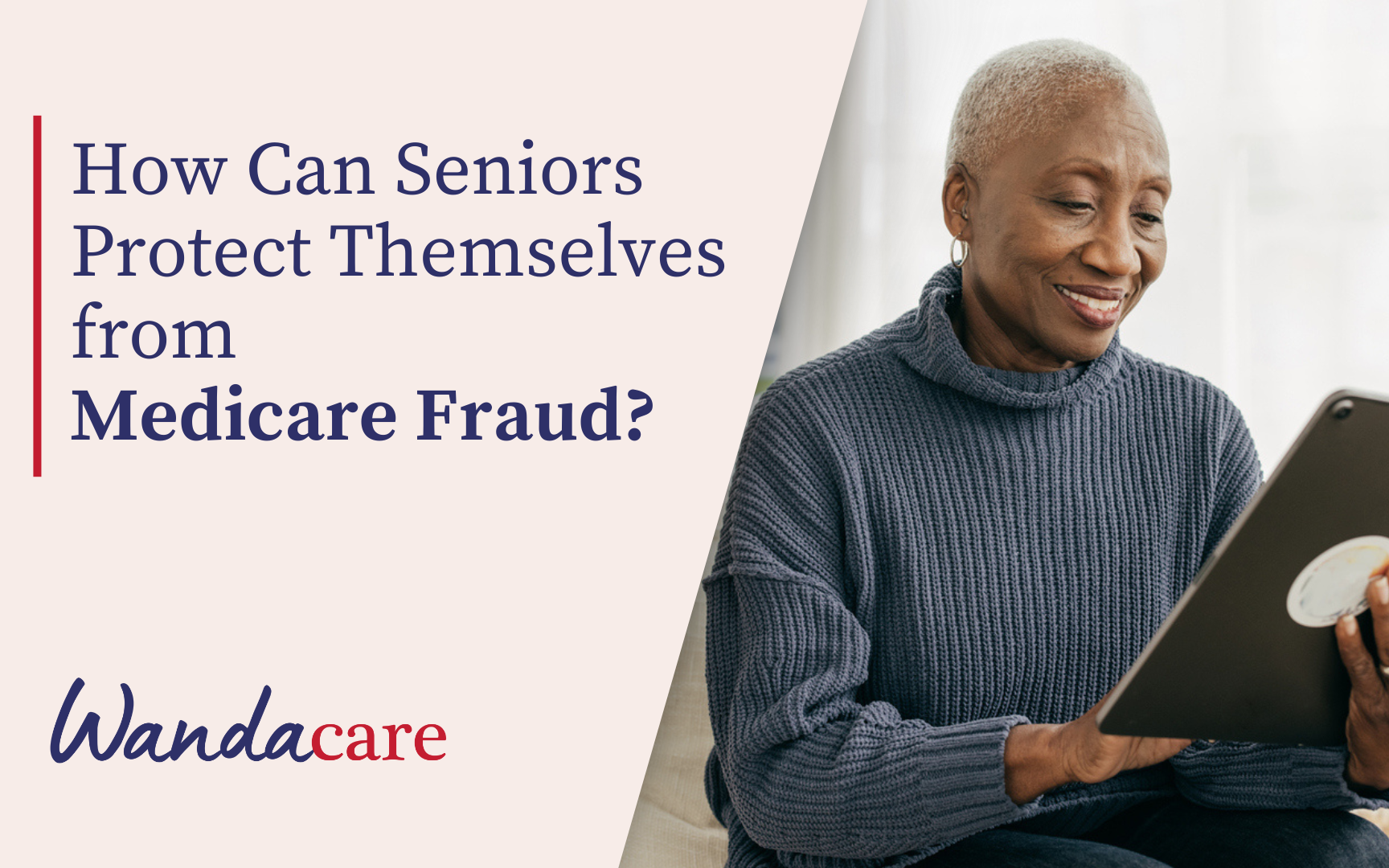How Can Seniors Protect Themselves from Medicare Fraud?
Medicare fraud costs the U.S. government (and the U.S. taxpayer) more than $100 billion a year, according to estimates from the National Health Care Anti-Fraud Association. The sheer size of Medicare and the amount of spending—upwards of $901 billion a year for 65 million beneficiaries—make the fraud lucrative for criminals.
Unfortunately, seniors often make easy targets for these criminals committing healthcare fraud. But you don’t have to be a victim or unwitting accessory of Medicare fraud. By being aware of the most common Medicare fraud and ever evolving scams targeting seniors, you can know how to protect yourself, your benefits, and be on the lookout for any fraudsters who try to strike.
Common Medicare Scams: What to Watch For
Criminals need legitimate Medicare IDs and patient information as a base for their fraudulent operations. They’ll use every channel available to try to get it, from calling, texting, mailing, emailing, or even showing up at your door.
“I’m Calling from Medicare:” Phone Scams
One of the easiest ways for criminals to get your info is to call you and ask for it. These spam and robo-calls, often originating from overseas, are at an all time high.
If someone calls you claiming that…
· You need to update your plan information
· You need a new Medicare card
· You are eligible for a Medicare refund
· You are eligible for free medical equipment from Medicare
· They need to “verify” your “new” Medicare card, current coverage, and/or billing information
…it is most likely a scam.
Medicare will NEVER call you unsolicited and ask for you to provide information. If you have a Medicare Advantage Plan, know your plan provider and ask the caller to verify themselves. Or better still, hang up and call your Advantage Plan provider yourself to question them about a call you just received. It’s highly unlikely that the call originated from them.
Medicare scams can spike during the Annual Enrollment Period when fraudsters know Medicare recipients have the option to update and change their plan coverage. There’s a good chance you’ll receive unsolicited calls from individuals, agencies, or insurance companies selling Medicare Advantage Plans. Some will be legitimate but many will not. To verify, ask where you can meet with an agent in person, get website information you can Independently verify, or request a quote or plan information be sent to you.
Never say “yes” to a plan or provide your payment information over the phone. If you feel you’re being pressured by a sales pitch or the offer sounds too good to be true, hang up. Licensed insurers and brokers are prohibited from offering you cash or gifts for enrolling It’s probably a scam.
“The Refund’s in the Mail:” Mail Scams
There’s a good chance that your mailbox is overflowing with unsolicited mailers and ads for Medicare plans, especially during Open Enrollment. Any mailers offering you refunds, gifts, or free supplies “paid for by Medicare,” and urging you to “act now to claim,” are using illegal sales tactics and are probably scams.
In the midst of that “junk mail” is legitimate Medicare communications—your open enrollment notification, plan election documents, claim statements, and medical billing. Familiarize yourself with what your legitimate plan communications look like so you can spot the fakes. Scammers often impersonate a medical provider to send you a fake bill, hoping you’ll pay it without thinking twice.
Always double check any bill for services provided against your quarterly Medicare Summary Notice that comes from Medicare or your Explanation of Benefits statements from your Medicare Advantage Plan. If the date, service, and amount on the “bill” don’t match with your statements, you could be looking at a fraudulent bill.
“Medicare’s At My Door:” In-Person Scams
While phone, mail, and electronic mail scams give criminals the ability to target a mass amount of people at once, often leaving little-to-no trace, they’re not above (or beneath) doing a little leg work and showing up at your door.
Just like Medicare will NEVER call you unsolicited, they will NEVER send unsolicited representatives to your home either. Could legitimate insurance agents and brokers be going door-to-door to sell coverage, especially during the Medicare Open Enrollment Period? Yes, but be on the lookout for pushy sales tactics and promises of gifts and freebies.
If someone is at your door claiming they are there to provide “Medicare-approved services,” this should be something you are aware of and scheduled ahead of time. If not, they are scammers.
You can even come across scammers and frauds in what should be safe places for seniors–like health or senior fairs. You’ve probably seen booths there from Medicare agents and providers. Unfortunately, scammers sometimes make it in. Beware of any booths offering large increment gift cards for enrolling or requesting your Medicare ID on a sign-up sheet. No legitimate agent will be asking for this.
“I Read It on the Internet:” Email and Web Scams
Have you received an email from Medicare? Are you sure? Email phishing scams have become quite sophisticated, often using what appear to be legitimate Medicare email addresses and even logos and content that appear to be from Medicare to redirect you to a website that looks identical to the Medicare.gov page—and steal your login credentials, Medicare ID, and other sensitive information.
Even if an email appears to be a legitimate communication from Medicare or your Medicare Advantage Plan provider, never log into your account by following the link in an email. Any emails claiming to be from them are most likely a scam.
While many of these emails are phishing for IDs to commit Medicare fraud, many scammers use Medicare as a ploy to get seniors to hand over personal information, like SSN, credit card, and banking info. Their end game? Steal your identity, sell the info on the dark web, or access (and drain) your bank account.
Practical Steps to Safeguard Your Medicare Benefits
Safeguarding your Medicare benefits starts with safeguarding your personal information. This can help prevent large scale Medicare fraud, but also protect you from any loss of benefits, fraudulent charges, and identity theft.
Here are the steps you can take to protect yourself:
Protect your Medicare card. One of the best ways to do this is to handle it just like you would a credit card. Don’t leave it out or hand it over to anyone who asks for it without verifying why. If your card is lost or stolen, be sure to check your statements and medical billing for any fraudulent activity.
Protect your Medicare Number and your Social Security Number. Again, just like your Medicare card and Social Security card, don’t give out this information to anyone who calls, emails, or texts asking for it. Your doctor, medical staff, insurers, and verified Medicare representatives are the only ones who should have, or be asking for, this information.
Understand how Medicare or your Medicare Advantage Plan will use your personal information. You will receive a notice outlining how your medical information may be used and disclosed and how you can access your medical information. You can read the Medicare notice here. This will help you identify legitimate communications about your medical information.
Know how Medicare or your Medicare Advantage Plan will contact you. The best way to avoid handing over your information to a scammer is to know how your insurance providers will contact you. For example, if you didn’t opt in for text or email communications, they should not be contacting you this way.
Check your Medicare statements. Be sure any bill you receive aligns with the service dates and Medicare payments on your statement. In turn, check your statements for accuracy. Any “duplicate” services or questionable payments could be red flags for Medicare fraud.
Be cautious about unsolicited Medicare calls and emails. Securing your Medicare enrollment is important, as it involves personal choices. While Wandacare’s team can legitimately assist with enrollment over the phone or email, be wary of unexpected calls. Stay alert if you didn’t start the conversation or recognize the caller. Unfortunately, some enrollments occur without individuals’ knowledge through seemingly harmless chats. Being actively aware is crucial in safeguarding your Medicare choices.
Contact Wandacare for Personalized Medicare Advocacy and Advice
If you’ve been receiving suspicious Medicare communications or think you may be the victim of Medicare fraud, the Wandacare Team is here for you. With over a decade of experience, we are your personal Medicare advisors providing advocacy and assistance, so you have continued confidence in your Medicare coverage.




